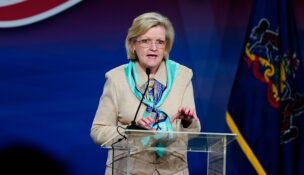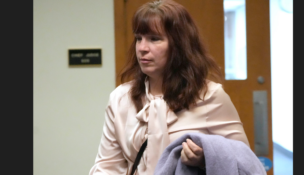Like father, like son: Attorneys join their parents in practice
By: dmc-admin//February 8, 2010//
 In 1995, attorney James K. Jaskolski was fresh out of law school and handling one of his first divorce cases.
In 1995, attorney James K. Jaskolski was fresh out of law school and handling one of his first divorce cases.
While he sat quietly next to his client, Ronald J. Jaskolski, his father and boss, thundered away at opposing counsel.
“I was getting almost sick to my stomach because it was so contentious, and I remember thinking to myself, ‘I’m just so glad I’m sitting at this table instead of the other one,’” the younger Jaskolski said.
While his father may be known as a “teddy bear” off the clock, the eye-opening experience gave James Jaskolski an idea of what to expect during the next 15 years of practice.
The early lesson helped both men draw a line between their professional relationship at Jaskolski & Jaskolski SC in Milwaukee and their personal relationship.
The failure to do that can make or break a father-son firm.
In his 45 years of practice, the elder Jaskolski, 69, has seen several family law firms fail, in part because children expected easy success working for a parent.
“None of those people are with those firms now because they couldn’t hack it, and I think the reason is because they didn’t grow up,” Ronald Jaskolski said. “Dad was gone all the time working his buns off, and when he sees the kids in the business of law, they don’t work hard.”
Avoiding nepotism
When Milwaukee personal injury attorney Steven G. Kmiec joined his father, Marjan “Marty” R. Kmiec in 1991, it wasn’t a case of favoritism.
Though he expected to join his father’s practice, there were several other attorneys working at the firm at the time and the younger Kmiec knew he had to prove himself.
He said he learned very quickly “out of necessity,” handling his first workers’ compensation case during his first week and his first trial less than a month after graduation.
But he also relied on his experience working for the firm prior to law school and his clerkship there to build credibility with his colleagues.
During his clerkship, Steven Kmiec did bookkeeping work and settlement review, which gave him a sense for the value of personal injury cases. Once he joined the firm, he was ahead of the typical associate. Because he didn’t need the same training, that helped impress other attorneys at the firm.
“I wanted to watch out for nepotism and how other attorneys gauged me at the firm,” Kmiec said. “I think it is something that becomes difficult to contend with at times.”
But Kmiec acknowledges the father-son relationship does give him the freedom to aggressively argue his point of view in cases, for better or worse.
Marty, now 80, admits his trial philosophy has always been to “hold out for the last buck” for a client. He recalls one instance where his son encouraged a settlement in a medical malpractice case.
“Steve said we should settle with one of the defendants, but I wanted to go after the big gun,” Kmiec said. “Ultimately, that trial went down the tubes” and the case was lost on the issue of liability.
The elder Kmiec admits that he “probably did a double take” the first time his son challenged him on a case, but came to realize the value of Steven’s input.
For example, in a class action against a drug company over a vaccine, Steven Kmiec was able to convince his father that despite limited options for litigation because the drug was FDA-approved, there was a successful failure to warn claim.
“We had a number of referrals based on those results,” he said.
Father knows best?
Steven Kmiec, 45, said he relishes the ability to freely trade constructive criticisms with his dad, without the fear of repercussions.
“When you are talking about underlying issues to a partner, if you have those heated exchanges, you could find yourself out of the firm if it happens too often,” Kmiec said.
That’s not the case when the partner is also your parent.
Jaskolski, 41, maintains the same open dialogue with his father. But he said at times it’s hard to argue with Ronald’s experience.
“He’s been doing this for more than 40 years,” Jaskolski said of his father. “But sometimes I want to argue a little bit just to get his blood pressure up.”
The younger Jaskolski also works with his mother, who is the firm administrator.
At times, he said the pressure to succeed can be daunting.
“It’s kind of hard to deal with sometimes because there’s a lot tied up in this,” Jaskolski said. “It’s been a little bit strange at times, but it’s not a disadvantage, just a reality.”
Still, neither set of father and son practitioners said they have any regrets.
Marty Kmiec, who is transitioning into retirement, is grateful to have someone to continue the family practice.
“I’ve known a number of sole practitioners, who when they passed on, that was it,” he said. “Their clients were divided amongst other attorneys and the business went kaput.”
His son doesn’t expect that to happen.
“I get a lot of referrals from people who know my dad or the name, but also from their sons and daughters as well,” Steven Kmiec said. “It gives me a lot of pride that I can continue the firm.”
Legal News
- Wisconsin lawyers file University of Wisconsin public records request seeking answers to protests
- Wisconsin Supreme Court issues orders amending Supreme Court rules and Wis. Stats.
- EXCLUSIVE: Former Milwaukee ‘big law’ partner attacks news media for bias against Trump
- Former Milwaukee election official fined for obtaining fake absentee ballots
- Contract dispute prevents airing of 15 regional sports networks, impacts Brewers
- Wis. middle school focuses on recovery as authorities investigate shooting
- Gov. Evers seeks applicants for Sheboygan and Green County Sheriffs
- North Carolina man who harbored Nazi memorabilia and attacked Black and Latino men sentenced to 41 months
- Nation grieves with families of officers killed in NC
- Amended complaint filed in federal court against State Bar of Wisconsin seeks punitive damages
- United Healthcare suit against cancer drug distributor time-barred
- Trump’s Wisconsin visit warns of jail time if he violates a trial gag order
WLJ People
- Power 30 Personal Injury Attorneys – Russell Nicolet
- Power 30 Personal Injury Attorneys – Benjamin Nicolet
- Power 30 Personal Injury Attorneys – Dustin T. Woehl
- Power 30 Personal Injury Attorneys – Katherine Metzger
- Power 30 Personal Injury Attorneys – Joseph Ryan
- Power 30 Personal Injury Attorneys – James M. Ryan
- Power 30 Personal Injury Attorneys – Dana Wachs
- Power 30 Personal Injury Attorneys – Mark L. Thomsen
- Power 30 Personal Injury Attorneys – Matthew Lein
- Power 30 Personal Injury Attorneys – Jeffrey A. Pitman
- Power 30 Personal Injury Attorneys – William Pemberton
- Power 30 Personal Injury Attorneys – Howard S. Sicula











